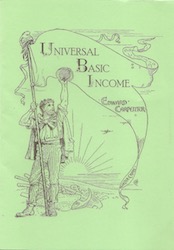How would society change if no-one needed to work to stay alive? That was the question Edward Carpenter set out to answer almost 130 years ago in an essay titled ‘Transitions to Freedom’. Would it hail a new collectivist phase? And would that then lead to full individual and social liberty?
A well-known independent writer and socialist, Carpenter’s argument was first published in a collection called Forecasts for the Coming Century alongside contributions from Tom Mann, William Morris, Enid Stacy, Grant Allen and George Bernard Shaw.
 Now badged as Universal Basic Income, his thoughts have been re-issued in a new pamphlet from the Sheffield-based co-operative resource centre, Principle 5, described on the back cover as “vital reading for all those people who dream of a better tomorrow”.
Now badged as Universal Basic Income, his thoughts have been re-issued in a new pamphlet from the Sheffield-based co-operative resource centre, Principle 5, described on the back cover as “vital reading for all those people who dream of a better tomorrow”.
The essay, says Chris Olewicz in his thoughtful Preface, is one of Carpenter’s “key political texts”, showing him at his “inquisitive best” as he ponders “what would happen to society if people did not need to work in order to live fulfilling lives”.
“Over 100 years later,” writes Olewicz, “society is no closer to answering this question, even though it feels as if the days of mass employment in well-paying jobs are coming to an end.”
The burden of fear
For Carpenter, it was the mass employment of the “wretched wage-slave” in the late 19th century – and how to create more rewarding and socially useful kinds of work – that most exercised him, for capitalist society, he wrote, was “animated first and foremost by fear”.
“I want the reader to imagine for a moment this burden of fear lifted off the hearts of a whole people, and the result,” he says.
“Let us imagine … some transcendental Chancellor of the Exchequer has assured us all … a decent provision for all our days of the actual necessaries of life; so that for the future no man could feel any serious or grinding anxiety for his own material safety or that of his family. What would be the result of our actions?”
Carpenter imagines a world in which “the main motives to activity are neither fear, nor greed of gain, but rather community of life and interest in life”; in which “enormous wealth will be produced and handled not for the profit of the few but for the use of the many; a voluntary collectivism working within and parallel to the collectivism of the state”.
As Olewicz points out, in hindsight “it could be easy to look back at Carpenter’s ‘forecasts’ and his subsequent revisions as utopian”.
“However,” he adds, “‘Transitions to Freedom’ [still] raises important questions that need answering, particularly with the attention given to UBI in recent years, but also as a consequence of the rise of artificial intelligence and the need to alleviate the pressure we put on our finite natural resources.”
Vital reading, then, for people who hope for a better tomorrow.
—-
Universal Basic Income by Edward Carpenter is available for £5 from Principle 5, Yorkshire Co-operative Resource Centre, Aizlewood’s Mill, Nursery Street, Sheffield S3 8GG.
It is the fifth in Principle 5’s series of re-publications. The first two were also by Edward Carpenter – Sheffield and Socialism and Co-operative Production.
All the P5 pamphlets are available here.


